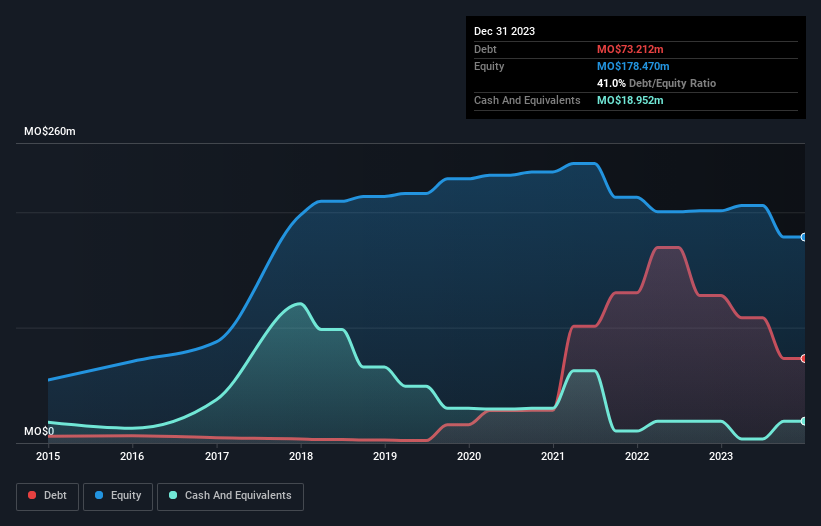Some say volatility, rather than debt, is the best way to think about risk as an investor, but Warren Buffett famously said that 'Volatility is far from synonymous with risk.' So it seems the smart money knows that debt - which is usually involved in bankruptcies - is a very important factor, when you assess how risky a company is. We note that Kin Pang Holdings Limited (HKG:1722) does have debt on its balance sheet. But the real question is whether this debt is making the company risky.
When Is Debt Dangerous?
Debt assists a business until the business has trouble paying it off, either with new capital or with free cash flow. Ultimately, if the company can't fulfill its legal obligations to repay debt, shareholders could walk away with nothing. While that is not too common, we often do see indebted companies permanently diluting shareholders because lenders force them to raise capital at a distressed price. Of course, debt can be an important tool in businesses, particularly capital heavy businesses. The first step when considering a company's debt levels is to consider its cash and debt together.
Check out our latest analysis for Kin Pang Holdings
What Is Kin Pang Holdings's Net Debt?
The image below, which you can click on for greater detail, shows that Kin Pang Holdings had debt of MO$73.2m at the end of December 2023, a reduction from MO$127.7m over a year. However, it also had MO$19.0m in cash, and so its net debt is MO$54.3m.

How Strong Is Kin Pang Holdings' Balance Sheet?
We can see from the most recent balance sheet that Kin Pang Holdings had liabilities of MO$286.4m falling due within a year, and liabilities of MO$2.85m due beyond that. On the other hand, it had cash of MO$19.0m and MO$282.6m worth of receivables due within a year. So it actually has MO$12.2m more liquid assets than total liabilities.
This surplus suggests that Kin Pang Holdings has a conservative balance sheet, and could probably eliminate its debt without much difficulty. When analysing debt levels, the balance sheet is the obvious place to start. But you can't view debt in total isolation; since Kin Pang Holdings will need earnings to service that debt. So if you're keen to discover more about its earnings, it might be worth checking out this graph of its long term earnings trend.
Over 12 months, Kin Pang Holdings made a loss at the EBIT level, and saw its revenue drop to MO$583m, which is a fall of 2.7%. That's not what we would hope to see.
Caveat Emptor
Importantly, Kin Pang Holdings had an earnings before interest and tax (EBIT) loss over the last year. Its EBIT loss was a whopping MO$24m. Looking on the brighter side, the business has adequate liquid assets, which give it time to grow and develop before its debt becomes a near-term issue. But a profit would do more to inspire us to research the business more closely. So it seems too risky for our taste. There's no doubt that we learn most about debt from the balance sheet. However, not all investment risk resides within the balance sheet - far from it. To that end, you should learn about the 2 warning signs we've spotted with Kin Pang Holdings (including 1 which is significant) .
When all is said and done, sometimes its easier to focus on companies that don't even need debt. Readers can access a list of growth stocks with zero net debt 100% free, right now.
Valuation is complex, but we're here to simplify it.
Discover if Kin Pang Holdings might be undervalued or overvalued with our detailed analysis, featuring fair value estimates, potential risks, dividends, insider trades, and its financial condition.
Access Free AnalysisHave feedback on this article? Concerned about the content? Get in touch with us directly. Alternatively, email editorial-team (at) simplywallst.com.
This article by Simply Wall St is general in nature. We provide commentary based on historical data and analyst forecasts only using an unbiased methodology and our articles are not intended to be financial advice. It does not constitute a recommendation to buy or sell any stock, and does not take account of your objectives, or your financial situation. We aim to bring you long-term focused analysis driven by fundamental data. Note that our analysis may not factor in the latest price-sensitive company announcements or qualitative material. Simply Wall St has no position in any stocks mentioned.
About SEHK:1722
Kin Pang Holdings
An investment holding company, engages in the provision of building and ancillary services in Macau and Hong Kong.
Mediocre balance sheet with low risk.
Market Insights
Community Narratives



